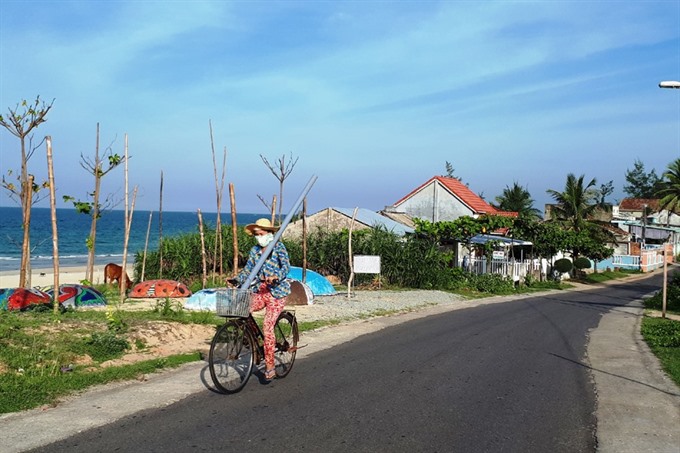 Society
Society

Hundreds of young men in the coastal villages around Đà Nẵng central city have given up off-shore fishing to work as taxi drivers, another sign that the traditional way of life on the central coast is changing fast.
 |
| Nam Ô coastal village in Đà Nẵng City is struggling for survival amid the urbanization whirlwind. Photo laodong.vn |
ĐÀ NẴNG — Hundreds of young men in the coastal villages around Đà Nẵng city have given up off-shore fishing to work as taxi drivers, another sign that the traditional way of life in the central coast is changing fast, the Lao động (Labour) newspaper reports.
Tưởng, a Grab car driver in Đà Nẵng City, explained, “I used to be an off-shore fisherman, a captain, but I gave up my off-shore fishing job to buy a car and earn money as a driver for Grab.”
He said his native land of Thọ Quang Ward, Sơn Trà District was home to hundreds of fishermen who had struggled to find work. They had to borrow money to buy cars to run Uber, Grab taxi services.
They were experienced in the sea but not always familiar with the roads, so while driving they depended on smartphones with the Google map app, according to Tưởng.
“When driving to the mountains area, the phone loses the signal and they have to ask for directions from the people,” he said. “However, they have the hardiness and honesty of seafarers.”
According to Tưởng, the group of Grab drivers he knows include 10 captains of off-shore fishing boats in Sơn Trà District, who had to borrow from the bank half of the total VNĐ1 billion they needed to buy a car to work for Grab.
After the fishermen started new jobs, they still kept contact and helped each other, Tưởng said.
They were accustomed to working together from years in an uncertain industry. Difficulties they faced were not only continuous natural disasters, pirates and attacks from foreign ships, but also a lack of manpower.
A captain or ship owner needs not only a love for the sea, but also capital and a team of loyal fishermen.
Now, in Đà Nẵng, it is difficult to find young off-shore fishermen. After the coastal countryside areas were urbanized, traditional offshore-fishing families didn’t want their children following the old ways.
In previous years, Đà Nẵng ship owners could recruit fishermen in Quảng Nam and Quảng Ngãi. But now, fishermen in the traditional coastal areas such as Núi Thành, Duy Xuyên and Quảng Nam are also quitting the job.
With such a scare labour force, ship owners struggled to pay enough to persuade fishermen to stick with them when they could go elsewhere.Before every trip to sea, in addition to preparing food, equipment and fuel, the ship owners had to pay advance money for workers, at least VNĐ10 million each.
Đỗ Phú Ban, director of Đà Nẵng City’s Department of Agriculture and Rural Development, said that in recent years, the State has worked to support fishermen. But with old-fashioned methods and a seascape hard-hit by climate change and overfishing, the economic value of any single trip to sea is low.
Nguyễn Sự, former secretary of the Hội An Ancient Town’s Communist Party Committee, has said that fishermen “will be exiled in their own land”.
Traditional offshore-fishing villages have been destroyed by tourism projects, resorts, urban areas and industrial parks, so off-shore fishing jobs have also gradually disappeared.
Bình, living at Tân An hamlet, Bình Minh Commune, Thăng Bình District, said that recently, people have poured in to buy land here at high price.
At Bình Dương Commune’s coast, land prices have fluctuated between VNĐ4-5 million/sq.m. Many fishing households sold their garden plots for the VNĐ5-7 billion to buy a car and change jobs.
The money, however, cannot take away what people feel when they see traditional villages disintegrated and fishermen leaving the sea: pity. — VNS




